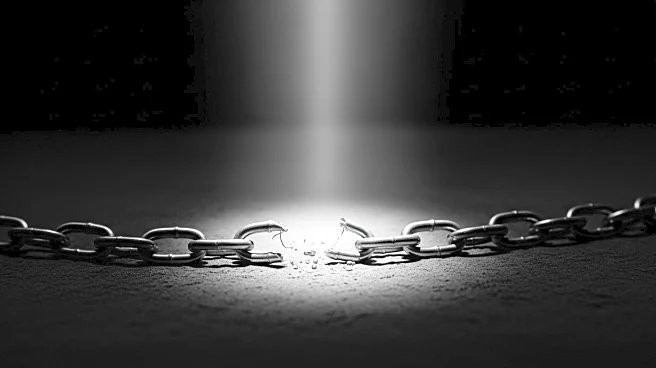What's Happening?
Emily Damari, a British-Israeli citizen, shared her harrowing experience of being held captive by Hamas for 471 days during a public appearance at the UJIA fundraising gala in London. Damari was kidnapped from her home in Kibbutz Kfar Aza along with her friends Gali and Ziv Berman, who remain in captivity. She recounted the psychological struggle and inhumane conditions she endured, including being confined in an overcrowded cage. Damari expressed gratitude to the British Jewish community for their support during her captivity. Her appearance coincided with remarks from President Isaac Herzog, who emphasized the shared values between Israel and the UK Jewish community.
Why It's Important?
Damari's story highlights the ongoing issue of hostages held by Hamas, with 48 individuals still in captivity. Her advocacy for their release underscores the broader geopolitical tensions involving Israel, Hamas, and international stakeholders. The event also served as a platform for President Herzog to reinforce Israel's stance against Hamas and Iran, framing the conflict as a defense of the free world. Damari's criticism of UK Prime Minister Keir Starmer's potential recognition of a Palestinian state adds a layer of diplomatic complexity, suggesting that such moves could embolden extremists and undermine peace efforts.
What's Next?
Damari continues to advocate for the release of hostages, including her friends Gali and Ziv Berman. The international community, including political leaders like Prime Minister Starmer, faces pressure to address the hostage situation and the broader Israeli-Palestinian conflict. Damari's public rebuke of Starmer's stance on Palestinian statehood may influence diplomatic discussions and policy decisions. The ongoing captivity of hostages remains a critical issue that could impact future negotiations and peace efforts in the region.
Beyond the Headlines
Damari's experience and advocacy highlight ethical and moral considerations in international diplomacy, particularly regarding the recognition of state entities under conditions of conflict and terrorism. Her story raises questions about the legitimacy of political actions that may inadvertently reward violence, challenging leaders to consider the long-term implications of their decisions. The event also underscores the role of civil society and diaspora communities in supporting individuals affected by geopolitical conflicts.











